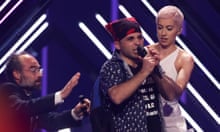The organisers of the Eurovision song contest have defended their decision to disqualify the Netherlands’ contestant just hours before last Saturday’s grand final, saying the version of event portrayed by the Dutch side “does not correspond with statements shared […] by staff and witnesses”.
Dutch singer and rapper Joost Klein, 26, was kicked out of the competition in the Swedish city of Malmö over an “incident” after Thursday’s semi-final involving a female member of the production crew, the precise nature of which has been the subject of an ill-tempered disagreement between the music event’s organisers and Dutch broadcaster Avrotros.
After Klein’s expulsion was confirmed on Saturday afternoon, Avrotros said it was “shocked” by the “disproportionate” decision, insisting Klein merely made a “threatening move” towards a female camera operator but had not touched her.
“Against the clearly made agreement, Joost was filmed when he had just gotten off stage and had to rush to the green room. At that moment, Joost repeatedly indicated that he did not want to be filmed. This wasn’t respected,” Avrotros said.
But in a statement on Tuesday, the European Broadcasting Union (EBU) said Avrotros’s version of events, which has been widely shared on social media, did not correspond with the witness accounts shared with the organisers and Swedish police.
“Joost’s behaviour was in clear breach of contest rules, which are designed to ensure there is a safe working environment for all staff and to protect the production”, EBU’s statement said.
“We are not pre-judging the legal process but, given the circumstances of what occurred and the fact that the police case will shortly be handed to the prosecutor, it would not have been appropriate for Joost to participate in the grand final.”
It added that the decision to exclude him was backed by the contest’s governing body and unanimously supported by the EBU executive board, “following a thorough internal investigation”.
Citing a source “with very good insights”, Swedish Aftonbladet reported on Monday that the incident occurred in connection with Klein leaving the stage after his performance in the semi-final, and that the woman’s camera had been damaged during the altercation.
Prior to his disqualification, Klein’s gabber-pop song Europapa was seen as one of the favourites in the contest, which was eventually won by Swiss singer Nemo.
It was the first time in Eurovision’s 68-year history that a contestant has been disqualified after the start of the five-day event.









